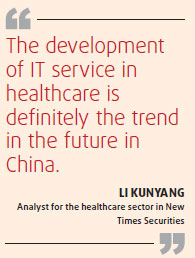

The United States-based computer services company Perot Systems recently announced the opening of its healthcare IT services operation in Changsha, capital of central China's Hunan province.
Perot Systems will specialize in healthcare consulting, clinic transformation and related service delivery operations.
The move was just after the central government's 4 trillion yuan stimulus package to boost its economy was announced in November. The medical sector is set to profit from the investment in improving health care services under the package.
Perot Systems, with a revenue of $2.6 billion in 2007, has a longstanding reputation as one of the largest IT services providers in healthcare in the US.

Two weeks ago, it just announced the acquisition of Tellurian Networks, a managed services provider of electronic medical records, though financial terms were not disclosed.
It's a logical step for the company to expand its ambition in China, especially at a time when the economy is mature and the government supports the development of the healthcare industry.
Perot Systems established its initial presence in China in late 2005 in Shanghai with a few people as part of its global delivery operations to its multinational customers.
Now it plans to have Changsha become one of its primary delivery centers to serve customers in Hunan province and throughout China.
The company also announced the appointment of David Miller as managing director for the company's China region.
Miller says when he joined Hewlett Packard (HP) in 2001, the situation was similar to what he is doing for Perot Systems now. There were only a few people in HP's China delivery center. But after five years, HP has operations in Shanghai, Dalian, Beijing and Chongqing, with a total of 2,200 employees and HP's China Center is the second largest strategic base for HP software application services delivery.
"As a marketing consultant, I think now it is a perfect time for IT service providers to come to China as the economy is mature and people want to pay for the service," he says. "But before when people buy a product, they only want the product rather than value added services."
Apart from the healthcare IT service sector, Perot also plans to bring its outsourcing services business to the region as Changsha is one of 16 national outsourcing service bases.
China's out-sourcing industry has developed quickly in recent years. In the first eight months of this year, the country's outsourcing contracts hit $1.9 billion, up 17 percent over the same period last year, according to the Ministry of Commerce.
Statistics indicate that world cross-border services and software outsourcing businesses volume hit $400 billion in 2007. The figure is expected to reach $1.6 trillion by 2010.
"There will be tremendous opportunities for outsourcing services in China, and Perot would like to help boost the outsourcing service industry in China," says Russell Freeman, chief operating officer for Perot Systems.
Earlier last month, the company reported a third quarter revenue of $711 million, an increase of 9 percent year-to-year from the same period in 2007.
"Our company stayed stable amid the financial crisis," says Freeman. "Forty-six percent of our revenue is based on healthcare IT services. People cannot avoid going to the hospital even in a financial crisis."
But Perot Systems has forecast fourth-quarter results below expectations after it saw a drop of $25 million in revenue due to certain changes in contracts with clients.
"The development of IT service in healthcare is definitely the trend in the future in China," says Li Kunyang, analyst for the healthcare sector in New Times Securities. "And the government's 4 trillion yuan stimulus package will help to accelerate the process but we still don't know when. It is complicated to predict the prospect in a few years."
"Another challenge will be the access to the hospitals as most of them are publicly owned. So how to deal with the local governments seems to be a challenge for newcomers," he says.
Miller says the Chinese health care IT services industry is scattered and small, which means the market has huge potential.
But he also feels the challenge is how to get the message out.
"We historically didn't spend much money on markets and have depended on customer recognition," he says. "But now time has changed and we need marketing promotion to be globalized."
(China Daily 12/01/2008 page6)













